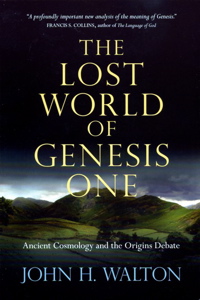Two Fun New Books
I just learned about two new books that I'm interested in reading. (Editor: Isn't that true of every book you hear about?)
 This one interests me because Dr. John Walton interests me. I transcribed a sermon he gave on Genesis one, Why Didn't God Call the Light, Light?, and have read some shorter pieces he's written. His perspective on the Origins debate and Genesis one is unique and thought provoking. I've wanted to learn about it in more detail ever since I heard his message. This book is my big chance.
This one interests me because Dr. John Walton interests me. I transcribed a sermon he gave on Genesis one, Why Didn't God Call the Light, Light?, and have read some shorter pieces he's written. His perspective on the Origins debate and Genesis one is unique and thought provoking. I've wanted to learn about it in more detail ever since I heard his message. This book is my big chance.
Westminster Books has a PDF with some sample pages from the book. The publication date is "July 30, 2009", but Amazon claims to have it in stock. Amazon also includes two brief blurbs for the book:
This book presents a profoundly important new analysis of the meaning of Genesis. Digging deeply into the original Hebrew language and the culture of the people of Israel in Old Testament times, respected scholar John Walton argues convincingly that Genesis was intended to describe the creation of the functions of the cosmos, not its material nature. In the process, he elevates Scripture to a new level of respectful understanding, and eliminates any conflict between scientific and scriptural descriptions of origins. ----Francis S. Collins, head of the Human Genome Project and author of The Language of God
Walton's cosmic temple inauguration view of Genesis 1 is a landmark study in the interpretation of that controversial chapter. On the basis of ancient Near Eastern literatures, a rigorous study of the Hebrew word bara' ('create'), and a cogent and sustained argument, Walton has gifted the church with a fresh interpretation of Genesis 1. His view that the seven days refers to the inauguration of the cosmos as a functioning temple where God takes up his residence as his headquarters from which he runs the world merits reflection by all who love the God of Abraham. -- The Publisher
 This one interests me because John Calvin interests me and this is a novelization of his life. Since I discovered it through Tim Challies's review, I'll let him do the talking.
This one interests me because John Calvin interests me and this is a novelization of his life. Since I discovered it through Tim Challies's review, I'll let him do the talking.
The Betrayal, published by P&R; Publishing, comes from the pen of Douglas Bond who has written several historical fiction novels in the past. In this new book, he writes from the perspective of a lifelong sworn enemy of Calvin--a boy who grows up in the same town and who, as a man, remains involved with Calvin's life to the very end. As the publisher says, "This fast-paced biographical novel is a tale of envy that escalates to violent intrigue and shameless betrayal." I hesitate to say too much about the plot lest I inadvertently ruin it for those who would like to read the book.
... As for me, well, I'll be honest and say that I read fiction only on rare occasions and my preference would always be to read a standard biography over a historical novel. However, I do know that a lot of readers prefer fiction and for these people, I think The Betrayal will be a great way of getting a useful overview of Calvin's life. I was sometimes amazed at just how much of Calvin's life is present in this book but never in such a way that the novel becomes bogged down in irrelevant details. Bond has done a great job of integrating reality with fiction so the reader will hardly know when one begins and the other ends.
If you are a fan of novels or of historical fiction, and if you are anxious to learn a little bit about John Calvin, this man who is so fondly remembered even five hundred years after his birth, you cannot go far wrong in reading The Betrayal.
I like novels a lot more than I like most biographies (killing the memory of great people and events under a pile of dusty prose since the beginning of time), so this is the "biography" of Calvin that I'd like to read.